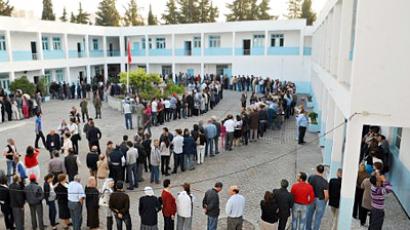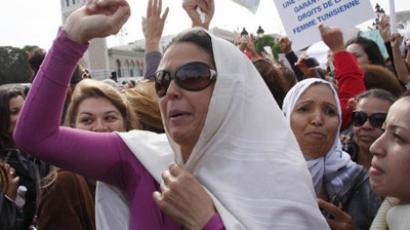Tunisians fear Sharia-law state may be looming
Tunisia is marking the first anniversary of the revolution that triggered the Arab Spring and changed the face of the entire region. And while the country can boast a peaceful transition of power, radical religious ideas are on the rise.
It may have looked like a successful revolution – getting rid of an authoritarian regime, while retaining its Westernized façade. But in the parliamentary elections that followed, Tunisians voted Ennahda, an Islamist Party, to power. It now firmly holds the majority of seats in the new parliament.“We don’t have the political culture here in Tunisia, it’s new for us, it’s the first experience,” social activist Haifa Ben Abdallah told RT. “Making the choice between political programs – it was hard, especially with the political programs of the Islamists, who pushed people to choose between Muslims and non-Muslims . Either you believe in God, and if you’re not Islamist – you don’t believe in God.”But Western tourists have nothing to fear. The Party’s leaders say beer and bikinis – regular staples of Tunisia’s holiday hot spots – are here to stay.Yet, recent events at the Manouba University, one of the largest in the country, show that Tunisian ways are, indeed, changing.Major protests erupted at the university when several female students came in wearing a niqab – a traditional Islamic headdress covering most of the face, leaving only the eyes visible. The university authorities believed this to be unacceptable and prohibited such headdress from being worn on campus. The students went on a strike saying their freedom was being oppressed.“It was a minority of students and they were on strike for three weeks. Two of those weeks the university was closed on the Provost and Education Council’s decision,” Dr. Leila Blibi, a professor of history at the Manouba University, explained. “The majority of students were against the strike, but they were threatened by those in the minority. We held out on principle. We are against girls wearing a headdress in lecture halls and during the exams. It’s a question of security and of trust between professors and students. It’s unacceptable.”Professor Blibi acknowledged the students' right to wear whatever they please – after all, she says, this is the essence of freedom. But in the case with niqab, she felt it differ from the simple issue of dress-code, since usually a headdress serves to protect the woman from possible unwanted advances.“A female student in a headdress personally debases me, as if I were some kind of an angry animal, which can harm her,” Dr. Blibi continued. “This is where we’re faced with the issue of mutual understanding, without which the educational process is impossible.”And activists for women rights in the country believe the underlying political tendencies are thinly veiled by the strikes at the Manouba University.“Whether a woman wears a niqab or whatever else – these things are unimportant,” a political activist and lawyer, Bochra Belhag Hmida, explained. “Universities, schools provide education. I’m not afraid of women’s desire to wear a headdress, I’m afraid that this issue may be used to provoke other problems.”The parliamentary opposition, meanwhile, fears this may mean bad news for the newborn Tunisian democracy.“We're worried that we may slump down to a new hegemony, a new authoritarian rule by one of the representative parties,” said Dr. Samir of the Manouba University. “Ennahda received 40 per cent of the seats in the assembly. The post of prime minister is also theirs. Every Tunisian is afraid that confrontations and riots may occur.”Ennahda leaders have given a number of assurances that they are not going to turn the country into a strict Sharia-law state. Yet, many seem to agree that the worrying early signs are already there.














